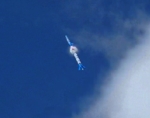Optical Apogee Detector
-
Bibbleycheese

- Advanced Member

- Posts: 31
- Joined: Mon Jul 20, 2009 9:38 am
Optical Apogee Detector
I though I'd share what I've been playing with - an optical apogee detector.
This circuit is based on one by Bernard Willaert http://users.skynet.be/willaert/WR/optogee.htm and uses an LM393 comparator to compare the inputs from a pair of photodiodes, one looking up and one looking down.
Because the sky is brighter than the ground the circuit can detect when the rocket tips over, and trigger a parachute release.
You can see my web page about this here http://sites.google.com/site/littlesqui ... detection#
And here's a little video of my test circuit. Any good?
[youtube][/youtube]
Because the sky is brighter than the ground the circuit can detect when the rocket tips over, and trigger a parachute release.
You can see my web page about this here http://sites.google.com/site/littlesqui ... detection#
And here's a little video of my test circuit. Any good?
[youtube][/youtube]
- Andy
Little Squirts Water Rockets
Little Squirts Water Rockets
-
WRA2

- Site Admin

- Posts: 1089
- Joined: Sat Dec 30, 2006 11:30 pm
Re: Optical Apogee Detector
Nice Job. They say a photo is worth a thousand words, but an embedded video is worth a million. 
Keep up the good work.
Keep up the good work.
Lisa Walker,
 Forum Administrator.
Forum Administrator. 
 The Water Rocket Achievement World Record Association
The Water Rocket Achievement World Record Association 
-
fori
- New Member
- Posts: 1
- Joined: Mon Sep 06, 2010 5:19 am
Re: Optical Apogee Detector
We use similar device that works with UV LEDs. The latest version of this sensor has a weight of only 6 grams and works very reliably.
Here's a short video demonstrating the operation of the device.
[youtube][/youtube]
This detector is available now for sale at a very attractive price:
http://cgi.ebay.co.uk/ws/eBayISAPI.dll? ... _918wt_930
Fori
Here's a short video demonstrating the operation of the device.
[youtube][/youtube]
This detector is available now for sale at a very attractive price:
http://cgi.ebay.co.uk/ws/eBayISAPI.dll? ... _918wt_930
Fori
-
Bibbleycheese

- Advanced Member

- Posts: 31
- Joined: Mon Jul 20, 2009 9:38 am
Re: Optical Apogee Detector
I hadn't thought of using UV-LEDs as photodetectors, but I gave them a try and they work a treat!  I guess it's that clear casing they have lets the light in. I'll have to try the UV-LEDs in the next unit I fabricate.
I guess it's that clear casing they have lets the light in. I'll have to try the UV-LEDs in the next unit I fabricate.
In the meantime, here's a video of my Optical Apogee Detector unit mounted inside a parachute release pod, ready to be stuck on the top of a rocket and tested.
[youtube][/youtube]
It's too bulky right now, all packed out with polystyrene for protection - but I'm hoping that it will prove reliable when I test it on the rocket.
In the meantime, here's a video of my Optical Apogee Detector unit mounted inside a parachute release pod, ready to be stuck on the top of a rocket and tested.
[youtube][/youtube]
It's too bulky right now, all packed out with polystyrene for protection - but I'm hoping that it will prove reliable when I test it on the rocket.
- Andy
Little Squirts Water Rockets
Little Squirts Water Rockets
-
Bibbleycheese

- Advanced Member

- Posts: 31
- Joined: Mon Jul 20, 2009 9:38 am
Re: Optical Apogee Detector
Here is LS-Op1 on the launchpad.
Unfortunately, even though the optical detector works perfectly well on the bench, in the field it fails.
The problem appears to be in the way the PICAXE chip interprets the data from the comparator.
Although it seems to supply a good digital upside-down / not upside-down signal, the PICAXE will not accept this - either interpreting a high or a low all the time.
I've tried switching the PICAXE input from digital to analogue - and this gives reliable results on the bench, but outdoors it fails 3 out of 10 times - which is no good. I've tried tweaking the analogue level at which the PICAXE triggers, but still no improvement in reliability so far.
What I'm going to try is build a more sensitive detector array using UV-LEDs spaced further apart, and see if this will improve the quality of the signal. I could also try routing the output from the comparator through a gate to clean-up the digital signal - but it's back to the breadboard for now.
The problem appears to be in the way the PICAXE chip interprets the data from the comparator.
Although it seems to supply a good digital upside-down / not upside-down signal, the PICAXE will not accept this - either interpreting a high or a low all the time.
I've tried switching the PICAXE input from digital to analogue - and this gives reliable results on the bench, but outdoors it fails 3 out of 10 times - which is no good. I've tried tweaking the analogue level at which the PICAXE triggers, but still no improvement in reliability so far.
What I'm going to try is build a more sensitive detector array using UV-LEDs spaced further apart, and see if this will improve the quality of the signal. I could also try routing the output from the comparator through a gate to clean-up the digital signal - but it's back to the breadboard for now.
- Andy
Little Squirts Water Rockets
Little Squirts Water Rockets
-
U.S. Water Rockets1

- WRA2 Member

- Posts: 1778
- Joined: Sat Feb 03, 2007 3:24 pm
Re: Optical Apogee Detector
Bibbleycheese wrote:Here is LS-Op1 on the launchpad. Unfortunately, even though the optical detector works perfectly well on the bench, in the field it fails.
The problem appears to be in the way the PICAXE chip interprets the data from the comparator.
Although it seems to supply a good digital upside-down / not upside-down signal, the PICAXE will not accept this - either interpreting a high or a low all the time.
I've tried switching the PICAXE input from digital to analogue - and this gives reliable results on the bench, but outdoors it fails 3 out of 10 times - which is no good. I've tried tweaking the analogue level at which the PICAXE triggers, but still no improvement in reliability so far.
What I'm going to try is build a more sensitive detector array using UV-LEDs spaced further apart, and see if this will improve the quality of the signal. I could also try routing the output from the comparator through a gate to clean-up the digital signal - but it's back to the breadboard for now.
Andy,
Are you sure the sensors are not simply getting swamped with light when you are flying the rocket? The place where you are standing to do your testing may not be reflective. When you launch the rocket the field of view widens and perhaps there are reflective surfaces on the ground that come into view and confuse the sensors.
Team U.S. Water Rockets
Visit USWaterRockets.com
Visit our Blog
Tune in to our YouTube Channel
Visit our Facebook page
Visit our Twitter Page
Opportunity is missed by most people because it is dressed in overalls and looks like work. --Thomas Edison
Visit USWaterRockets.com
Visit our Blog
Tune in to our YouTube Channel
Visit our Facebook page
Visit our Twitter Page
Opportunity is missed by most people because it is dressed in overalls and looks like work. --Thomas Edison
-
Bibbleycheese

- Advanced Member

- Posts: 31
- Joined: Mon Jul 20, 2009 9:38 am
Re: Optical Apogee Detector
That might be an option.U.S. Water Rockets1 wrote: The place where you are standing to do your testing may not be reflective. When you launch the rocket the field of view widens and perhaps there are reflective surfaces on the ground that come into view and confuse the sensors.
I was launching over grassy scrubland on a particularly overcast day. There's a good chance that there wasn't enough difference in the light levels from sky and the ground.
I learned a new word from Mythbusters - the episode when they debunked the Moon landing conspiracy; and the word is Albedo.
When I've been testing the sensor, it seems I've been luck enough to have a sunny clear sky above, and dark green grass below. On my launch site, on the day I went to try the unit out in flight, it was completely overcast and guess what - I didn't test the thing was working before launching.
Fail to plan - Plan to fail!
So I dug out the old photographic light meter and next time I'm over there I'll take some measurements.
But I like your point about widening field of view. And now doubt is beginning to flash a fin.
This might mean that actually, like mercury switches, optical apogee detection will be at best unreliable in flight.
I hope not.
Now what I'm hoping is someone out there has some video footage of an optical apogee detector working in flight.
Anyone?
- Andy
Little Squirts Water Rockets
Little Squirts Water Rockets
-
U.S. Water Rockets1

- WRA2 Member

- Posts: 1778
- Joined: Sat Feb 03, 2007 3:24 pm
Re: Optical Apogee Detector
You might consider a sensor that is looking at a different part of the spectrum. Perhaps an infra-red sensor would pick up the heat from the ground better than it would see it in the empty sky. Or perhaps a sensor looking for UV would see more scattered in the atmosphere than reflecting from the ground. The concept is workable, as opposed to be mercury switch idea, which physics has proven to be impossible.Bibbleycheese wrote:That might be an option.U.S. Water Rockets1 wrote: The place where you are standing to do your testing may not be reflective. When you launch the rocket the field of view widens and perhaps there are reflective surfaces on the ground that come into view and confuse the sensors.
I was launching over grassy scrubland on a particularly overcast day. There's a good chance that there wasn't enough difference in the light levels from sky and the ground.
I learned a new word from Mythbusters - the episode when they debunked the Moon landing conspiracy; and the word is Albedo.
When I've been testing the sensor, it seems I've been luck enough to have a sunny clear sky above, and dark green grass below. On my launch site, on the day I went to try the unit out in flight, it was completely overcast and guess what - I didn't test the thing was working before launching.
Fail to plan - Plan to fail!
So I dug out the old photographic light meter and next time I'm over there I'll take some measurements.
But I like your point about widening field of view. And now doubt is beginning to flash a fin.
This might mean that actually, like mercury switches, optical apogee detection will be at best unreliable in flight.
I hope not.
Now what I'm hoping is someone out there has some video footage of an optical apogee detector working in flight.
Anyone?
Team U.S. Water Rockets
Visit USWaterRockets.com
Visit our Blog
Tune in to our YouTube Channel
Visit our Facebook page
Visit our Twitter Page
Opportunity is missed by most people because it is dressed in overalls and looks like work. --Thomas Edison
Visit USWaterRockets.com
Visit our Blog
Tune in to our YouTube Channel
Visit our Facebook page
Visit our Twitter Page
Opportunity is missed by most people because it is dressed in overalls and looks like work. --Thomas Edison

